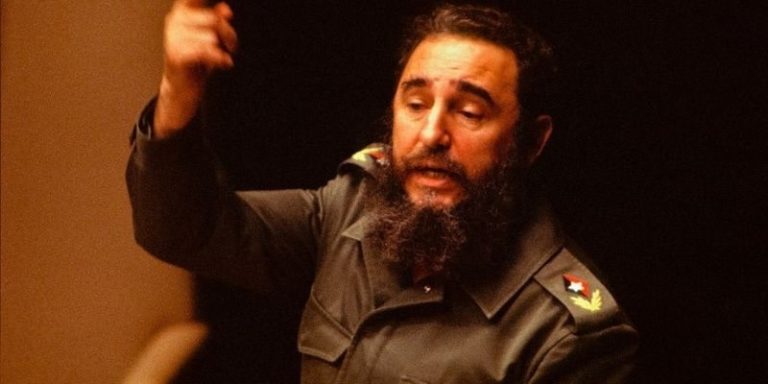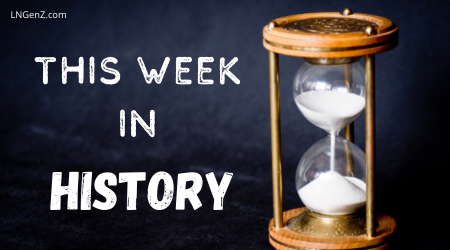This Week in History – July 24-30
Fidel Castro’s Revolution Began.
By: Kelli Ballard | July 24, 2022 | 925 Words

Fidel Castro (Photo by Chuck Fishman/Getty Images)
“Difficulty is the excuse history never accepts.” ~ Edward Murrow
July 26, 1953: Cuban Revolution Began
This day in history, also known as the beginning of the “26th of July Movement,” was the beginning of Fidel Castro’s revolution that eventually led to a rebellion that forced out leader Fulgencio Batista from Cuba.
Events Leading to the Cuban Revolution
The US military oversaw Cuba after the Spanish-American war until 1902, when the island became a republic. In 1925, Gerardo Machado was elected Cuba’s president and became the country’s first dictatorial ruler. But in 1933, a revolt led by Batista ended his reign. The revolutionary leader took his turn at being president from 1940 to 1944, but when it looked like he would not be re-elected in 1952, Batista overthrew the government and canceled the elections.
Before Batista came into power, Castro had been an activist and a young lawyer. He had been running for a seat in Congress as part of the Cuban People’s Party. But, after Batista became president, Castro started forming a group to try and overthrow the dictator. This first attempt happened on July 26, 1953.
Castro led a raid in Santiago de Cuba against the Moncada army barracks. The attack failed and most of the group was killed; however, Castro and his younger brother survived and were imprisoned. This only built his reputation as a revolutionary leader. Finally, Batista granted amnesty to prisoners in 1955, after a lot of international pressure. Castro was one of the prisoners released.
Castro went to Mexico. In November 1956, the rebellion army tried once again but Batista learned about it ahead of time and ambushed the revolutionaries on December 2. About 20 men, including Castro and his brother, escaped.
A corrupt November 1958 election continued, igniting even more determination from the rebels to see Batista, or anyone closely associated with him, out of office. In December, the 26th of July revolutionaries defeated an army garrison in the Battle of Santa Clara, and on January 1, 1959, Batista fled to the Dominican Republic, then later to Portugal, where he remained in exile until he died in 1973.
On January 9, Fidel Castro took charge of a new government and rounded up any who had supported Batista. Though he had fought against Batista’s dictatorship, Fidel Castro stopped elections and his government became a communist dictatorship. He stayed in power until 2008, then handed the presidency to his brother. Castro died in 2016.
Other Notable History Mentions
July 24, 1943: The Royal Air Force, in Operation Gomorrah during World War II, raided Hamburg. They tossed bales of aluminum foil strips overboard their ships which confused German radar screens. Because of that, only 12 of the 791 bombers were shot down.
July 24, 1945: Winston Churchill, Harry Truman, and representatives from China demanded unconditional surrender of the Japanese at the end of the Potsdam Conference in Germany. The Japanese, two days later, rejected the terms, unaware that the plans included an atomic bomb if they didn’t surrender.
 July 25, 1909: Louis Bleriot, in a small plane, made the first international overseas flight. He asked, “Where is England?” and then took off from France and landed near Dover, England. The British police greeted him when he landed.
July 25, 1909: Louis Bleriot, in a small plane, made the first international overseas flight. He asked, “Where is England?” and then took off from France and landed near Dover, England. The British police greeted him when he landed.
July 25, 1943: Just two weeks after the allied attack on Sicily, Mussolini was deposed, and a new government was formed in Italy.
July 25, 1956: Andrea Doria, an Italian luxury liner, collided with the Swedish ship Stockholm and sank. Nearby ships were able to rescue 1,634 people, including the crew and captain before it completely sank.
July 26, 1944: The US Army started to desegregate training camps and the first black platoons were assigned to white companies. The official order didn’t happen until President Harry Truman signed it on July 26, 1948.
July 26, 1945: The first unassembled atomic bomb was met by scientists who were waiting to complete it. The bomb was carried on the US Cruiser Indianapolis to Tinian Island in the Marianas.
July 27, 1953: After three years, an armistice was signed that ended the Korean War.
July 28, 1932: President Herbert Hoover ordered the Bonus March eviction in Washington, DC, to force about 15,000 veterans away from their encampment at Anacostia Flats. They had been protesting, demanding payment for a war bonus that was promised but not paid. General Douglas MacArthur, Major Dwight D. Eisenhower, and Major George S. Patton commanded the troops.
Famous Birthdays

Jackie Kennedy (Photo by PL Gould/IMAGES/Getty Images)
Simon Bolivar (July 24, 1783) was born in Caracas, Venezuela. He is known as “The Liberator” and as the George Washington of South Africa for working toward liberating six nations from the rule of Spain: Bolivia, Colombia, Ecuador, Panama, Peru, and Venezuela.
Alexandre Dumas (July 24, 1802) was born in Villers-Cotterets, France. A playwright and novelist, some of his most famous works include The Count of Monte Cristo and The Three Musketeers.
Amelia Earhart (July 24, 1898) was born in Atchison, Kansas. An American pilot, she was the first woman to fly alone across the Atlantic.
George Bernard Shaw (July 26, 1856) was born in Dublin, Ireland. An Irish playwright, some of his works include Man and Superman and The Doctor’s Dilemma.
Jackie Kennedy (July 28, 1929) was born in Southampton, New York. She was the wife of President John Fitzgerald Kennedy (JFK).
Benito Mussolini (July 29, 1883) was born in Dovia, Italy. He ruled Italy from 1922 to 1943, first as prime minister, and then as “Il Duce” which means the absolute dictator.
Henry Ford (July 30, 1863) was born in Dearborn Township, Michigan. He was an automotive pioneer and developed an assembly-line production system to build cars. He also started a $5 per day wage for automotive workers.
















